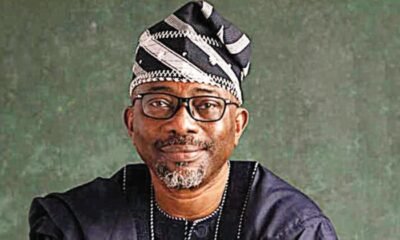

Hot
Shocking Reality: 1,364 Child Soldiers vs. 14,000 Schools – The Untold Story You Need to See!
Published
2 months agoon
By
OBS
The United Nations has decried the deepening humanitarian impact of terrorism in West Africa and the Sahel, revealing that 1,364 children were recruited by armed groups in 2024, while more than 14,000 schools were shut due to insecurity.
UN Under Secretary-General and Special Representative of the Secretary-General for West Africa and the Sahel, Leonardo Simão, disclosed this on Wednesday at the Regional Conference on Combating Emerging Terrorist Groups and Strengthening Sustainable Security in the ECOWAS Region and the Sahel, in Abuja.
Simão said the situation reflects “stolen futures, fractured communities, and deepening fragility,” as terrorist groups increasingly exploit ungoverned spaces, local grievances, and advanced technologies, such as drones and encrypted communications, to entrench their operations.
He said, “Furthermore, we have to recognise that terrorist organisations have shown a troubling ability to adapt—exploiting ungoverned spaces, inflaming community grievances, and employing advanced technologies, such as drones, encrypted communications, and cyber tools to execute strikes with greater precision and heightened psychological impact.
“As a result, the human cost is staggering: 1,364 children recruited by armed groups in 2024 across six countries; 466 cases of sexual violence; and 14,364 schools closed in the region due to insecurity. These numbers represent stolen futures, fractured communities, and deepening fragility.”
The UN envoy also said five of the 10 countries most impacted by terrorism are in West Africa and the Sahel, with fatalities rising in 2024.
He warned that extremist violence has expanded into sensitive border zones like the Tambacounda region, spanning Mali, Senegal, Guinea, and Mauritania, and even protected conservation areas, threatening livelihoods, eco-tourism, and biodiversity.
Simão said, “Among the 10 countries most impacted by terrorism in the world, five are in our region. The increase is not only in the number of attacks and victims but also in sophistication, as groups forge alliances and expand their operational reach.
“Terrorist activities are also spreading into sensitive border zones, such as the Tambacounda region, between Mali, Senegal, Guinea and Mauritania, and into protected areas like the Park W, Arly, and Pendjari, straddling Benin, Burkina Faso, and Niger. These incursions threaten livelihoods, biodiversity, and eco-tourism—proving that no space is beyond the reach of violent extremism.”
The envoy warned that persistent political tensions among neighbouring states and the effects of climate change are fuelling extremist recruitment, while resources continue to be diverted to defence spending.
He said, “We cannot ignore the impact of political tensions between neighbouring states in the region. These disputes undermine governance, erode cooperation, and create security gaps that terrorist and criminal networks exploit.
“Meanwhile, climate change continues to act as a threat multiplier—driving displacement, intensifying resource conflicts between farmers and herders, and forcing entire communities into precarious livelihoods. Terrorist groups exploit these vulnerabilities, embedding themselves in marginalised communities and using local grievances as recruitment tools.
“The Central Sahel is projected to spend $3.2bn on defence in 2025, diverting critical resources from education, health, and climate adaptation.”
He, however, called for the adoption of a holistic approach that combines military interventions with investment in political dialogue, improved social services, and sustainable development, paying particular attention to youth and women.
“Another important component is action against transnational organised crime—including drug trafficking, illegal mining, and arms smuggling—that finances terrorism,” he added.
Simão also commended recent efforts by ECOWAS to preserve free movement with the Alliance of Sahel States, as well as the cooperation between ECOWAS and the African Union to establish a Joint Threat Fusion and Analysis Cell for intelligence sharing.
Speaking at the event, Nigeria’s Minister of Defence, Mohammed Badaru, called for stronger regional cooperation in the fight against terrorism, warning that fragmented national responses are inadequate to confront a transnational threat that has become more sophisticated and adaptive.
Badaru said terrorism had become one of the greatest threats to peace and stability in the region and requires a collective response anchored on real-time intelligence sharing and coordinated military action.
“For too long, our responses have been fragmented. National efforts, though commendable, have not been sufficient against a transnational menace. Terrorism spreads whenever it finds weaknesses in our shared defences. Security in one country is inseparable from the security of its neighbours,” he said.
The minister stressed that a robust regional framework must place emphasis on intelligence as the “primary force multiplier” in combating extremist groups.
He urged ECOWAS member states to establish permanent platforms for the real-time exchange of intelligence on terrorist financing, movements, and recruitment.
Badaru said, “Intelligence must be integrated, not merely shared. The use of emerging technologies such as artificial intelligence for regional early-warning systems is no longer aspirational but necessary. Yet as we innovate, we must also uphold human rights and safeguard civil liberties. Security must strengthen legitimacy, not weaken it.”
He further advocated the institutionalisation of joint and multinational military operations under clear command structures, adding that the operationalisation of the ECOWAS Standby Force should be pursued with renewed vigour.
The defence minister argued that harmonising legal frameworks across ECOWAS states was equally critical to ensure that terrorists and their networks find no safe haven.
You may like
-
Naira Plummets for the Third Day in a Row: Shocking New Exchange Rate Hits N1,473.29/$!
-


Shocking Recall: Grocery Store Taco Kits Contain Hot Chocolate Packets!
-


Young Republicans Caught in Racist Group Chat Resign Following Shocking Revelations
-


Shocking Arrests: Four Charged in Murder of Osun Local Government Chair – What You Need to Know!
-


Lagos Pushes Back: Shocking Rejection of National Assembly’s Central Gaming Bill!
-


Shocking Revelations: Jonathan’s Fierce Attack on Successor for Neglected Bayelsa Projects!
Hot
Shocking Arrests: Four Charged in Murder of Osun Local Government Chair – What You Need to Know!
Published
2 weeks agoon
October 15, 2025By
OBS
Four suspects allegedly linked to the murder of the late Chairman of Irewole Local Government Area in Osun State, Remi Abass, were arraigned on Wednesday before the Federal High Court in Abuja.
The defendants — Abubakar Kabiru (also known as Jeje, 38), Tajudeen Opeyemi (30), Akeem Agbomojo (28), and Akintoye Olayemi (40) — all from Ikire and Apomu in Osun State, were arraigned before Justice Joyce Abdulmalik.
They were charged with terrorism, illegal possession of firearms, and the murder of Abass, who was killed on February 17, 2024, in Ikire, Osun State.
Appearing for the prosecution, A. S. Oyeyemi, represented the Inspector General of Police, while Sunday Adebayo appeared for the defendants.
Muhydeen Adeoye held a watching brief for the nominal complainants.
The amended charge, numbered FHC/ABJ/CR/170/2025, contained three counts.
In Count One, the defendants were accused of conspiring, aiding, and instigating acts of terrorism in various towns and villages across Osun State, contrary to and punishable under Section 26(1)(2)(a)(b)(c) of the Terrorism (Prevention and Prohibition) Act, 2022.
Count Two alleged that the defendants conspired to illegally possess firearms and were arrested with three pump-action rifles, contrary to Section 3 of the Robbery and Firearms (Special Provisions) Act, Laws of the Federation of Nigeria, 2004.
Count Three charged the defendants with the murder of Hon. Remi Abass, an offence contrary to Section 316 and punishable under Section 319 of the Criminal Code Act, Cap 38, Laws of the Federation of Nigeria, 2004.
All four defendants pleaded not guilty to the charges.
Following their plea, Justice Abdulmalik ordered that they be remanded at the Kuje Custodial Centre and adjourned the case to December 4, 2025, for hearing, in line with the agreement of counsel on both sides.
The killing of Abass is linked to the long-standing political tension between the All Progressives Congress and the Peoples Democratic Party in Osun State over control of local government councils.
In 2022, the then APC-led administration of former Governor Gboyega Oyetola conducted local government elections shortly before leaving office — polls which the PDP, then in opposition, boycotted and later challenged in court, describing them as unconstitutional.
After the PDP’s Senator Ademola Adeleke became governor, his administration dissolved the councils and appointed caretaker committees. However, in February 2025, the Court of Appeal declared that the election of the APC council chairmen and councillors was valid and ordered their reinstatement.
Following that judgment, tensions flared across several local government areas as the reinstated APC officials attempted to resume duties.
In the Irewole Local Government Area, clashes reportedly broke out between rival political supporters, leading to the death of Abass and several others.
The police subsequently launched an investigation into the violence, which resulted in the arrest and arraignment of the four defendants.
An earlier charge involving seven suspects, led by one Jide Jooda, was withdrawn by the prosecution after one of the accused died while awaiting trial.
The matter has now been adjourned to December 4, 2025.
Hot
Lagos Pushes Back: Shocking Rejection of National Assembly’s Central Gaming Bill!
Published
2 weeks agoon
October 15, 2025By
OBS
The Lagos State Government has faulted the National Assembly over the proposed Central Gaming Bill, warning that its passage would violate the Nigerian Constitution and a subsisting Supreme Court judgment.
Addressing a press conference in Lagos on Wednesday, Lagos Attorney General and Commissioner for Justice, Lawal Pedro (SAN), declared the move by the National Assembly as “a voyage of unconstitutionality.”
According to a report by the National Assembly Library Trust Fund, the Central Gaming Bill, 2025 was presented for concurrence during Senate plenary on October 7, 2025.
The bill seeks to establish a comprehensive regulatory framework for online and remote gaming, aiming to replace the previously repealed National Lottery Act of 2005.
The proposed legislation seeks to regulate the operation and business of online gaming across all states in Nigeria, including a specific provision for activities in the Federal Capital Territory.
The OBS reported in November 2024 that the Supreme Court nullified the National Lottery Act 2005, enacted by the National Assembly.
A seven-member panel of the court, in a unanimous judgment, held that the National Lottery Act 2005 should no longer be enforced in all states, except the FCT, in respect of which the National Assembly was empowered to make laws.
Speaking on Wednesday, Pedro said, “As the Chief Law Officer of Lagos State, it is both my constitutional duty and responsibility to draw the nation’s attention to the voyage of unconstitutionality embarked upon by the National Assembly to enact Act to regulate the operation and business of all forms of online and remote gaming across the geographical boundaries of the federating units and beyond the borders of Nigeria.”
He said the legislature cannot directly overturn a specific Supreme Court judgment, “though it is conceded it can indirectly nullify its effect, but only by changing the underlying law on which the judgment was based to remove the foundation of the judgment.”
“In this case, the underlying law is the Constitution of the Federal Republic of Nigeria and having not amended the Constitution of Nigeria to include in the exclusive legislative list item such as lottery, gambling and gaming, the Central Gaming Bill, as currently constituted, directly conflicts and contradicts the provisions of the extant Constitution of Nigeria and a subsisting and binding judgment of the Supreme Court of Nigeria on the subject.”
“Consequently, as of today, the National Assembly can only legislate on lottery, game and gambling for the Federal Capital Territory, Abuja,” he added.
Pedro warned that if the National Assembly proceeded with the Bill, “the consequences will be grave.”
“It would amount to legislating in defiance of a binding Supreme Court decision, which is the highest expression of contempt of court.”
Hot
Shocking Revelations: Jonathan’s Fierce Attack on Successor for Neglected Bayelsa Projects!
Published
2 weeks agoon
October 15, 2025By
OBS
Former President Goodluck Jonathan has lamented the abandonment of key projects he initiated as Governor of Bayelsa State, blaming successive administrations for failing to sustain his development agenda.
Speaking on Wednesday at the inauguration of the Best Western Plus Hotel in Yenagoa, Jonathan said he had begun several hotel projects, to attract tourism and investment to the state before he became Vice President in 2007.
He noted that those projects were left unattended after he left office, describing the trend as a major source of waste in governance.
“When a governor leaves office, the next governor doesn’t want to follow up, and most of the money spent goes to waste,” Jonathan said.
The former president recalled that his administration had invested in the hospitality sector to make Yenagoa more appealing to visitors, especially during the Africa Movie Academy Awards, which Bayelsa hosted at the time.
“During the first AMAA event, most of the international guests stayed in Port Harcourt because Bayelsa had no suitable hotels,” he said. “So we supported local hoteliers with loans of N10m to N15m to upgrade their facilities, but after I left office, nobody refunded the money, and the initiative died.”
He added that his government had also awarded contracts for the construction of three major hotels, including the Tower Hotel and two three-star facilities, which were never completed.
“If they had done these three hotels, by now visitors coming to Bayelsa State would have had comfortable places to stay, but somehow when I left, even people I mobilised, we didn’t see what they have done.
“That is the problem of government, when a governor leaves, the next governor doesn’t want to follow up, most of those money spent will go.”
Jonathan commended the management of Best Western Plus for bringing a world-class hospitality brand to the state, saying it fulfilled the vision he had for Bayelsa’s tourism industry.
In his remarks, Governor Douye Diri praised the hotel’s founder, Dr. Harcourt Adukeh, for his investment and commitment to the state’s economic growth.
Diri described the project as a landmark development that would boost the hospitality sector, create jobs, and encourage more private investment.
He urged Bayelsans to emulate Adukeh by investing in their home state to drive sustainable development.
Also speaking, the Executive Director of the hotel, Mrs. Initeme Aduke-Eromhonsele, and Dr. Adukeh highlighted the facility’s blend of elegance, comfort, and modern design, noting its serene view of the Oxbow Lake.
The launch of the Best Western Plus Hotel, an affiliate of the global Best Western brand, marks a new phase in Yenagoa’s emergence as a destination for tourism, investment, and premium hospitality in the Niger Delta.
Categories
Top Tags
Related posts





















